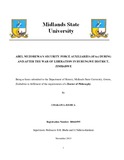Please use this identifier to cite or link to this item:
https://cris.library.msu.ac.zw//handle/11408/764| Title: | Abel Muzorewa’s security force auxiliaries (SFAS) during and after the war of liberation in Hurungwe district, Zimbabwe | Authors: | Chakawa, Joshua | Keywords: | Security force auxiliaries Liberation |
Issue Date: | Nov-2015 | Publisher: | Midlands State University | Abstract: | The Security Force Auxiliaries (SFAs) who actively fought for Bishop Abel Muzorewa in Zimbabwe’s war of liberation and their experiences remain a grey area in Zimbabwean historical studies. Their voices in the history of the armed struggle are conspicuously absent. Where they appear, they are simply castigated as those of sellouts, imperialist stooges, and traitors who are better ignored. Rhodesian writings which largely celebrate counter-insurgency also ignore the role of the Security Force Auxiliaries. What exist are ‘namings’ and ‘otherings’ such as ‘dzakutsaku’, ‘huruyadzo’ and ‘Pfumo Revanhu’ that are dependent on the enunciator’s ideological position. This thesis therefore fills an important gap in Zimbabwean political history through a focus on a neglected historical subject—that of SFAs in particular, and the manufacturing of political identities in general. At the centre of this thesis are such pertinent questions such as whom these SFAs were, why and how they were created and the role they played in the war. A case study of Hurungwe district is used because it was one of those complex theatres of war in which ZIPRA, ZANLA, Selous Scouts, Security Force Auxiliaries and regular Rhodesian colonial forces operated and competed for the ‘hearts and minds’ of the people. What is emerging from this thesis is that SFAs were generally recruited by force from mujibhas, hastily trained and often deployed to their areas of origin to fight against guerrillas while at the same time bringing back and defending colonial civil administration that was targeted by guerrillas for sabotage. One of the findings of this thesis, that will certainly disturb those who have accepted the idea of a popular anti-colonial liberation war, is the positive perception of auxiliaries as a force that indeed protected the people. This explains why, in part, there was no widespread violence against them in Hurungwe after 1980 and why at the end of the war SFAs were fully integrated into their families. This finding, however, does not discount the political challenges met by SFAs as their wartime role and identities continued to haunt them in post-war Zimbabwe. Thus, the thesis ends with an analysis of the postindependence national reconciliation and military integration which largely ignored SFAs. The exclusion of SFAs is part and parcel of the construction of political identities into insiders and outsiders as well as patriots and sellouts. Through this research, the SFAs’ version of Zimbabwe’s bush war is unveiled in order to fill an academic lacuna on blacks who fought against ZAPU and ZANU during the liberation war. The thesis deconstructs the role of such people as sellouts who were determined to block Zimbabwe’s independence. This is a historical study that draws its data from oral interviews with former SFAs and wartime civilians, archival as well as published and unpublished sources. | URI: | http://hdl.handle.net/11408/764 |
| Appears in Collections: | Thesis |
Files in This Item:
| File | Description | Size | Format | |
|---|---|---|---|---|
| Chakawa DPhil.pdf | 1.5 MB | Adobe PDF |  View/Open |
Page view(s)
488
checked on Mar 3, 2026
Download(s)
772
checked on Mar 3, 2026
Google ScholarTM
Check
Items in MSUIR are protected by copyright, with all rights reserved, unless otherwise indicated.



